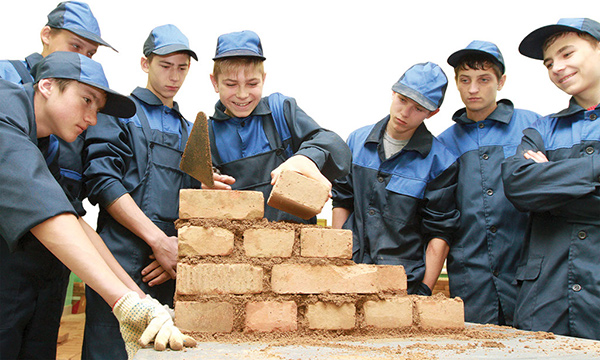Tens of thousands of citizens across Belarus and Russia move freely, without excessive formalities, between one Union country and the other annually, seeking employment suiting their qualification. It is a major achievement of Union integration. Quotas and permissions are in the past, as national diplomas, certificates of higher education and scientific degrees are mutually recognised. Belarusians and Russians fully use the right to choose their place of residence within the Union State, and have equal rights to education, health care, pension and other social security provision.

Corresponding legislation has been adopted by the Presidents of Belarus and Russia, and has been in use for over a year, bringing equality of rights for citizens. In this respect, the experience of the Union State serves as an example to our neighbours in the Eurasian Economic Union, and within other international integration associations.
Equal rights and opportunities allow people to seek out jobs and to receive worthy remuneration. In both countries, employer and employee have mutual understanding of the value of qualifications. Meanwhile, conditions of manufacturing are being constantly improved.
The recent Belarusian-Russian seminar devoted to equal rights for citizens across the Union State discussed the need to unify approaches to improving national systems of qualification. The Head of the Department of Information Policy and Social Security of the Standing Committee of the Union State, Margarita Levchenko, set the tone of discussion, saying, “One of the major purposes of the Union State is to co-ordinate social policy, to maintain worthy living standards. Its activity is determined by the Union State’s concept for social development. We’re currently facing an imbalance in the labour market, with varying requirements by employers and varying qualifications of graduates. A deficiency in well-qualified experts is constraining the economy.”
Belarus considers it vital to preserve and to improve upon the old Soviet system at the heart of training standards for personnel. The First Deputy Minister for Labour and Social Protection of Belarus, Andrey Lobovich, notes various problems, which bring discrepancies in the level of training to meet the requirements of the labour market. There is, without doubt, a deficiency in highly-skilled personnel, partly because qualifications rapidly become outdated. Our national system of qualification needs to be more effective, and more adaptable to economic needs, as is true also for Russia.
“To harmonise labour market policy within the Union State, we must undertake a course of reform, and exchange experience across various spheres of activity,” says Mr. Lobovich. “The need for well-qualified personnel is only increasing, so we need a new approach to developing our system of qualification. Workers need to be guided towards the skills sought by the labour market.”
Russia has been carefully monitoring Belarusian experience, with the Deputy Minister for Labour and Social Protection of Russia, Lyubov Eltsova, noting similar labour trends in both countries. She explains, “The level of workers’ qualification has been rising, with well-qualified experts comprising 31.9 percent of employees last year. Young people tend to favour humanitarian studies, despite job opportunities being less buoyant in this area than in others. Just 5.5 percent of those questioned admitted being ready to undertake further training for their current employment, while over 30 percent felt they were somewhat inclined to do so. In order to draw the educational system closer to the requirements of industry, we must improve training among teachers at enterprises.”
The National Council for Professional Qualification, under the President of Russia, tackles similar problems on the labour market, working methodically and liaising with various partners: representatives of trade unions and employers.
The main question is: in which direction should we be moving…? European experience has been studied, with its nine steps of qualification, bringing a corresponding set of legislation, involving local authorities, and co-ordinated standards.
We do not need to set aside everything about our former system of professional certification. On the contrary, Russian trade unions wish to build upon the previous platform, as do Belarusian experts. During the recent seminar, they showed interest in Russian colleagues’ ideas.
The Deputy Head of the Central Administrative Board of Labour and Salaries, of the Ministry of Labour of Belarus, Victor Sidorovich, tells us, “Economic structural reorganisation is changing requirements for qualification. The new system needs to be more flexible, with an updated system of judging the level of qualification. A document is now being submitted for Government consideration.”
Corresponding industrial councils are contributing their suggestions, helping shape the new system, so that it does reflect the needs of the economy. Individual experts are in demand, such as are trained by the Academy of Public Administration, under the aegis of the President of the Republic of Belarus. The First Pro-rector of the Academy, Alexander Ivanovsky, tells us that more mature people, including company heads, often undertake studies for secondary degrees, and are ready to pay for the privilege.
More than 80 percent of enterprise heads have primarily studied technical courses, with IT experts working at Minsk’s High-Tech Park standing out for their ‘niche’ expertise. They are able to work across the markets of various countries, although each has its own character, obliging them to adjust their qualifications accordingly.
The Deputy Director of the Park, Alexander Martinkevich, asserts, “Our services are not considered to be the cheapest. When Chinese companies launched onto the world programming market, we couldn’t compete on price: only on quality, thanks to the high level of training undertaken by our personnel. They need to be trained according to certain professional standards.”
The requirements of the economy, science and culture, across Belarus and Russia, are diverse, so requirements for professional qualification must change accordingly. This has direct bearing on Union integration, since approaches and standards in this sphere should be equally recognised in Belarus, and in Russia. Probably, this theme will be central to discussion at the next Forum of Regions of Belarus and Russia, which is to be devoted to Union State social policy.
By Vladimir Yakovlev












